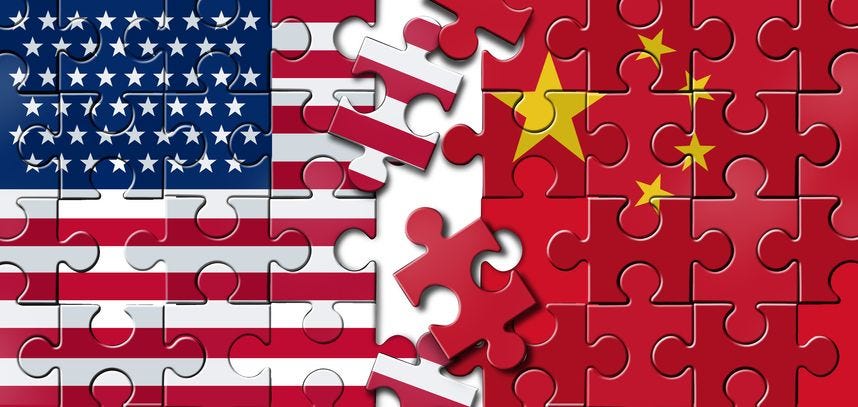The China Academy a repost
As the global AI race narrows to a U.S.-China showdown, why not drop the pretense and target China directly?
May 20 2025
On May 12th, the Department of Commerce’s Bureau of Industry and Security (BIS) formally rescinded Biden Administration’s AI Diffusion Export Control Rule and issued new guidance on restriction on using Huawei AI chips.
At first glance, it looks like just a “guidance document” without enforcement power, but a close reading reveals that this is the most straightforward restriction ever imposed on domestically produced AI chips in China. The term “advanced PRC IC” — meaning “advanced integrated circuits of the People’s Republic of China” — is replacing the previous complex and abstract language to become the key phrase in the new document.
The clearest example is the revised “guidance” from the BIS yesterday, which changed a statement from:
Issuing guidance that using Huawei Ascend chips anywhere in the world violates U.S. export controls.
to:
Issuing guidance alerting industry to the risks of using PRC advanced computing ICs, including specific Huawei Ascend chips.
Meaning: The national rivalry of AI between China and the U.S. has reached a fierce, razor-thin stage.
From “Chip Generation Controls” to “Country-Based Controls”
Before taking office, Trump sharply criticized the Biden administration’s “AI diffusion” rules. He argued that these rules were not only overly complex and redundant but also forced U.S.-based stakeholders to expend massive effort on compliance judgments. Moreover, the practice of categorizing countries based on closeness to the U.S. among allies hindered America’s ability to conduct effective “AI diplomacy.”
Trump’s team took a pragmatic and direct approach. Since the global contest over AI computing power, data, storage, training, and architectures is gradually converging into a showdown between the AI capabilities of China and the U.S., why not drop the pretense and aim directly at China?
The new “action guidance” issued by BIS significantly lowers the importance of chip parameters (such as computing power density) while elevating geographic (country-based) considerations to an unprecedented level.
This “control guidance” lists 11 “transaction behavior warnings” and 7 “due diligence obligations” for chip designers, manufacturers, and cloud service providers to identify whether clients might indirectly transfer advanced chips to China or other sensitive countries through “hidden channels.”
For example, U.S. hawks suspect Malaysia is becoming a loophole by combining whole-device assembly with parts “origin laundering” to circumvent U.S. export controls, prompting Malaysia’s Ministry of Investment, Trade and Industry (MITI) to strengthen customs inspections. The new rules aim to completely shut down this route.
Furthermore, the guidance does not adjust the category of “ECCN meeting or exceeding 3A090” with new technical parameters.
Traditionally, BIS has explored regulating integrated circuits for data centers based on total processing performance and performance density. The 3A090 classification involves computational bit lengths and thresholds of all processing units for high-performance chips. After 2023, “performance density” — total processing power divided by applicable die area — was added.
Over the past two years, BIS has repeatedly explained common questions and answers related to the 3A090 technical parameters in briefings.
Just as Trump likes to express political views with simple blunt language (e.g., “kiss my ass” ), under his leadership BIS is “simplifying the complex.” Rather than patching with endless footnotes, it is now laying the sticks and carrots on the table:
No country should use Chinese-made high-performance AI chips, or else face the “stick”;
Encourage countries to use U.S. AI chips, and if they do, offer the “carrot.”
The carrot and stick represent the blunt, unapologetic cold war-style containment of China in AI.
Is the U.S. Treating the Middle East as an AI Outpost?
The first recipients of the “carrot” are several wealthy Middle Eastern countries. Under Biden’s original “AI diffusion” regulations, countries like Saudi Arabia, Qatar, and the UAE were still subject to controls. The Biden administration feared the Middle East becoming a transit hub for China and tightly guarded its “Middle Eastern allies.”
But Trump changed tactics. Rather than trying to prevent trade between the Middle East and China, he decided to flood the market and completely exclude China from the Middle Eastern AI market.
Trump brought U.S. industry leaders like Jensen Huang (NVIDIA), Elon Musk, and Lisa Su (AMD) on a Middle East tour. Notably, Huang secured a multi-year deal with Humain.
Humain is a newly established subsidiary under the sovereign wealth fund founded by Saudi Crown Prince Mohammed bin Salman.
With government and sovereign fund backing, Humain unveiled an AI plan: partnering with NVIDIA to build an AI factory, aiming to deploy hundreds of thousands of NVIDIA’s most advanced GPUs over five years. The first phase will build an AI supercomputer composed of 18,000 GB300 Grace Blackwell chips and InfiniBand network technology.
Meanwhile, Musk announced at the Saudi-U.S. Investment Forum that his satellite internet provider Starlink received approvals in maritime and aviation sectors in Saudi Arabia.
Clearly, the meeting between Huang and Trump at Mar-a-Lago was not only about sealing deals but also about securing a foothold in the Middle East to absorb “excess capacity” created by excluding China. After all, NVIDIA, AMD, and TSMC form an interlinked value chain from design to manufacturing, and TSMC’s morale has been dampened by the weakening U.S. dollar against the New Taiwan dollar, needing consolation.
Even more alarming is America’s attempt to establish a global “GPU + IaaS + SaaS”technology standard, aggressively promoting it worldwide to block China’s chip technology progress and manipulate industry standards— an alternative, higher-dimensional form of control.
To read the full article, please visit https://thechinaacademy.org/u-s-takes-the-gloves-off-in-chip-war-with-china/




